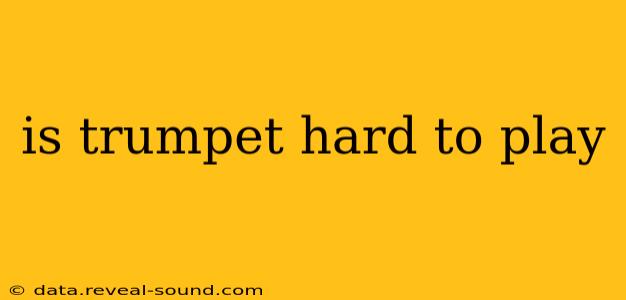The question of whether the trumpet is hard to play is a common one, and the answer, like most things in life, is: it depends. While some find it relatively easy to pick up the basics, mastering the trumpet requires dedication, practice, and a good understanding of both musical theory and physical technique. This guide will delve into the various aspects that contribute to the difficulty of playing the trumpet and help you decide if it's the right instrument for you.
What Makes the Trumpet Difficult?
Several factors contribute to the perceived difficulty of playing the trumpet:
1. Embouchure: Developing a proper embouchure (mouth position) is arguably the most challenging aspect. It requires precise control of your lips, jaw, and facial muscles to produce a clear, resonant tone. This takes time and consistent practice to develop and maintain. Incorrect embouchure can lead to discomfort, poor tone quality, and even lip injuries.
2. Breath Control: Trumpet playing demands significant breath control. You need to learn to support your notes with consistent air pressure from your diaphragm, ensuring a steady and controlled sound. Developing this control takes considerable practice and often involves specialized breathing exercises.
3. Finger Dexterity: While the trumpet's valve system is relatively straightforward, achieving smooth transitions between notes requires nimble fingers and precise coordination. This is particularly challenging when playing fast passages or complex musical pieces.
4. Range and Articulation: The trumpet boasts a wide range, spanning several octaves. Mastering this range and achieving clear, precise articulation requires significant practice and a strong understanding of musical theory. Tongue placement and air speed play crucial roles in clean articulation.
How Long Does It Take to Learn Trumpet?
There's no single answer to this question. Progress depends heavily on factors like:
- Natural aptitude: Some individuals naturally possess better coordination, breath control, or musical sensitivity, allowing them to progress faster.
- Practice consistency: Regular, focused practice is crucial. Short, frequent practice sessions are generally more effective than infrequent, lengthy ones.
- Quality of instruction: A good teacher can provide invaluable guidance, correcting bad habits early on and accelerating your learning curve.
- Personal goals: If you aim for professional-level performance, the journey will be longer and more demanding than if you aim for recreational playing.
Generally, you can expect to learn the basics within a few months of consistent practice. However, achieving proficiency and mastery can take years of dedicated effort.
Is Trumpet Harder Than Other Instruments?
Compared to other instruments, the trumpet's difficulty is relative. Some find it easier than instruments like the violin or piano, while others find it more challenging than the recorder or ukulele. The difficulty level depends heavily on individual strengths and weaknesses, learning style, and musical background.
Can Adults Learn to Play Trumpet?
Absolutely! While younger learners might have an advantage in terms of muscle flexibility and faster learning, adults can certainly learn to play the trumpet. Their life experiences often provide them with better self-discipline and a clearer understanding of goals, which can be beneficial in the learning process. Many adult learners find immense satisfaction in mastering a new skill later in life.
What are Some Tips for Beginners?
- Find a good teacher: A qualified instructor can provide personalized guidance and correct bad habits before they become ingrained.
- Practice regularly: Even short, consistent practice sessions are more effective than infrequent, lengthy ones.
- Focus on fundamentals: Mastering basic techniques like embouchure, breathing, and finger coordination is essential before tackling more complex pieces.
- Be patient and persistent: Learning any instrument takes time and effort. Don't get discouraged by setbacks; celebrate your progress and keep practicing.
- Listen to trumpet players: Listening to professional trumpet players can inspire you and help you develop your ear.
In conclusion, while the trumpet presents certain challenges, the rewards of mastering this expressive instrument are well worth the effort. With dedication, practice, and the right guidance, anyone can learn to play the trumpet, regardless of age or prior musical experience.
